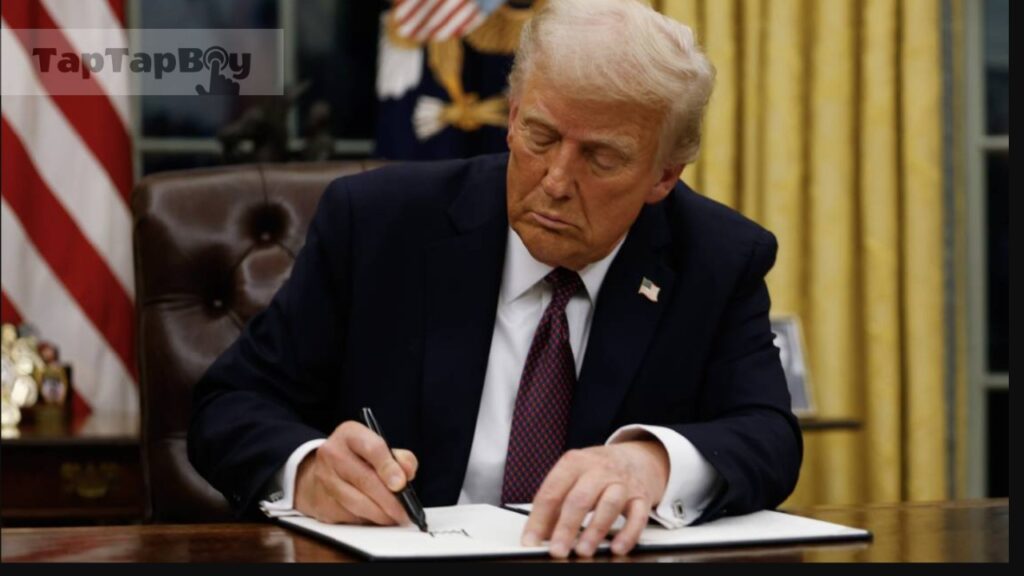
Trump Administration
The Trump administration has officially revoked Temporary Protected Status (TPS) for hundreds of thousands of Venezuelans living in the United States, a decision that is expected to have serious consequences for many families, particularly in Florida. The move, confirmed by Homeland Security Secretary Kristi Noem, marks another major shift in U.S. immigration policy under President Donald Trump’s second term.
What is Temporary Protected Status (TPS)?
TPS is a federal program designed to protect immigrants from deportation if their home country is facing war, natural disasters, or other crises. It also grants them work permits, allowing them to legally stay in the U.S. as long as the designation remains active.
For Venezuelans, this protection was first granted in March 2021 under President Joe Biden’s administration. The program allowed more than 320,000 individuals to apply for TPS at the time, and by 2023, it had expanded to cover an additional 423,000 Venezuelans. As of December 2024, there were 505,400 Venezuelans under TPS protection, according to the Congressional Research Service.
Why is the Trump Administration Ending TPS for Venezuelans?
During an interview on Fox and Friends, Kristi Noem confirmed that the administration had rescinded an 18-month extension of TPS that had been granted by the Biden administration just days before President Biden left office.
“Before he left town, Mayorkas signed an order that said for 18 months, they were going to extend protection to people on Temporary Protected Status, which meant they were going to be able to stay here and violate our laws for another 18 months,” Noem stated. “We stopped that.”
This reversal is part of a broader effort by the Trump administration to tighten immigration policies, with several executive actions aimed at reshaping the U.S. immigration system.
How Will This Affect Venezuelans in the U.S.?
Ending TPS protections means that many Venezuelans in the U.S. will be at risk of deportation once their current status expires. The impact will be especially severe in Florida, which has the largest population of TPS recipients in the country.
- Nearly 60% of TPS beneficiaries in Florida are from Venezuela.
- Many of them have built stable lives, working legally and contributing to local communities.
- Deportation could force them to return to a country still facing political instability, economic collapse, and humanitarian crises.
Tom Homan Appointed as “Border Czar”: A New Era of Immigration Policy
Will This Decision Face Legal Challenges?
This is not the first time that Trump has attempted to roll back TPS protections. During his first term, his administration tried to end TPS for immigrants from Haiti, El Salvador, Honduras, Nepal, Sudan, and Nicaragua. However, these attempts were challenged in court for years and ultimately failed.
Given that history, it is likely that the decision to revoke TPS for Venezuelans will also be challenged in the courts. Immigration advocates and Venezuelan community leaders have already spoken out against the decision, calling it inhumane and politically motivated.
Why is the U.S. Resuming Deportations to Venezuela?
The U.S. resumed direct deportations to Venezuela in October 2023, despite concerns from human rights groups about the dangers of sending people back to the country. Critics argue that Venezuela’s government is known for political persecution, and many deported individuals could face imprisonment or worse upon return.
However, the deportation process has been complicated due to U.S. sanctions on Venezuela. According to Tom Cartwright, an analyst who tracks deportation flights, no deportation flights have taken place for over a year. This pause is reportedly due to the U.S. government’s decision to re-impose economic sanctions on Venezuela.
The Trump administration has also been exploring alternative options, including deporting Venezuelans with criminal records to third countries, such as El Salvador.
What’s Next for Venezuelan Immigrants?
With TPS protections ending, thousands of Venezuelans may soon be forced out of the U.S., unless legal challenges manage to delay or reverse the decision. This is just one of several controversial immigration moves taken by the Trump administration in its early weeks, including:
- Limiting birthright citizenship
- Declaring a national emergency at the U.S.-Mexico border
- Canceling parole programs that benefited Cuban, Nicaraguan, Venezuelan, and Haitian immigrants
Conclusion
The decision to end TPS protections for Venezuelans is a major shift in U.S. immigration policy that will affect hundreds of thousands of people. While the Trump administration argues that these protections were being misused, critics warn that the move will devastate families, disrupt communities, and put thousands of Venezuelans in danger.
With legal battles likely on the horizon, the future of TPS for Venezuelans remains uncertain. However, one thing is clear—the immigration debate in the U.S. is far from over.
